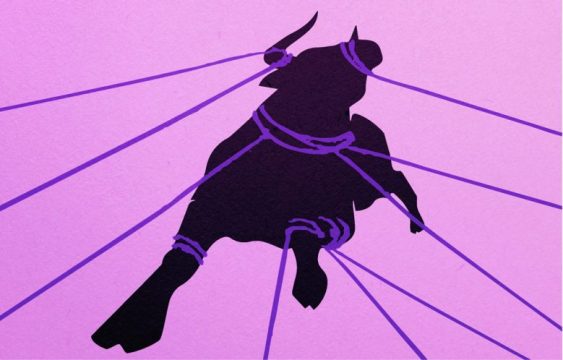The lure of Chinese beef market for Irish industry may be delusional, writes Mark Godfrey.
I recall a recent visit to a giant, modern beef factory in the city of Tianjin, another in Heilongjiang. The most striking thing is how quiet everything was. Staff in white overalls worked half the factory floor at the Heilongjiang plant; the rest was mothballed because there are no cattle to kill.
Meat factories were easy to build over the past decade with easy credit. In many cases, they were built by large firms with close relations to local governments which effectively control the credit levers at local state-owned banks. But then in the past two years central government intervened by setting strenuous water pollution control targets, and those same local officials stopped handing out permits for new plants and feedlots.
BETWEEN A ROCK AND A HARD PLACE
China is caught between an ambition to build world-class beef companies at home and an ever-more obvious realisation that environmental limits don’t allow it to do this at home. And while it has entertained Ireland’s ambition to sell it beef, China has been going out and securing farms, factories and herds in countries with which it has extensive trade relationships.
Old-economy industries like steel-making don’t deliver profits anymore, so China’s old industrial behemoths are putting money into things that do yield profit, like imported red meat, seafood and milk. A case in point is the massive Tianmu Group in Inner Mongolia which started from scratch in 2014, having no track record in beef processing but with plenty of ambition for Australian steers.
Likewise, the Maling Aquarius Co, a pork cannery, which thanks to its ties to Shanghai Bright, is buying 50% of one of New Zealand’s largest beef and lamb processors, Silver Fern Farms.
GREEN AND CLEAN
Ireland prides itself as a green-themed supplier of clean, quality beef. But while food safety is a selling point, scale is more important to Chinese importers of beef. They like to be assured of bulk quantities of the kind that Australia can supply in beef and New Zealand in sheep.
Those who want beef deals shouldn’t be criticising China
Free trade agreements with Australia and New Zealand made sense because it gives China access to suppliers of key commodities – iron ore, coal and uranium in Australia’s case. And thanks to the free trade deal, Australia has first-world banks and properties into which China’s elites can invest their money.
Likewise, access to resources also dictate the openness with which Brazil sells meat to China. Brazil and Argentina supply vast quantities of soybean, a critical ingredient for animal feed and cooking oil in China.
EMERGING MARKETS
Fobbed off for a decade by China on spurious veterinary grounds, the US beef sector has seen sales go to states like Uruguay and Costa Rica with whom Beijing preferred to do deals with rather than opening its doors to a powerful and efficient US beef industry which it didn’t own or control.
Scale and control are two of its requirements in meat sourcing, but China’s needs are also political. It opened up the beef market to the unlikely beef farming country of Costa Rica. Not because there’s anything particularly outstanding about the beef, but because Costa Rica had been a diplomatic ally of Taiwan and Beijing was willing to pay it to shift its embassy to Beijing.
Namibia, another unlikely beef player, which is shortly set to get entry to the Chinese beef market, has been a supplier of minerals to China and a hub for its extractive activities in the African region.
IRISH ACCESS
So what does Ireland have that China may want in return for access? We found out last month after Ireland supported a motion at the UN Human Rights Commission from the US that highlighted China’s practice of detentions and an emerging pattern of coerced returns of dissidents from outside the country. The implication from the Chinese foreign ministry was obvious – those who want beef deals shouldn’t be criticising China.
As a western Atlantic ally of the US, Ireland’s vote in international fora would be invaluable for China. This is not an isolated incident.
David Cameron is unlikely to ever again meet the Tibetan spiritual leader the Dalai Lama
China was able to effectively neuter criticism from Britain, a significant critic in the past, by anointing London a hub in the evolving market in offshore Chinese currency trading. Chinese investment was also offered for badly needed British infrastructure.
The prospect has been enough to silence London on the gradual erosion of Hong Kong civil and political rights. David Cameron is unlikely to ever again meet the Tibetan spiritual leader the Dalai Lama. Indeed no one, bar the US president, seems willing to meet the Dalai Lama or do or say anything that’s likely to offend China.
CHINA’S DEMAND
There’s been much made of China’s demand but it’s not clear that the Chinese were ever going to be significant purchasers of Irish beef. The demand is there, yes, access to the market is a quid pro quo that has little to do with the quality and traceability of Irish beef.
Beijing stands to lose nothing from blocking access to its markets given the clamour of countries seeking to supply the Chinese consumer with product. But there’s no need to give way to what may be an illusory market.
First Irish officials will be asked to accede to Beijing’s political demands. If they do they’ll unfortunately be following a trend among EU governments. Yet agreeing to Chinese terms won’t automatically lead to a sales bonanza, unless we’re able to meet the kind of need for scale and control that has characterised the big beef deals which China has signed.







